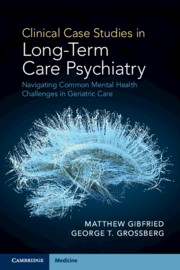 Clinical Case Studies in Long-Term Care Psychiatry
Clinical Case Studies in Long-Term Care Psychiatry Anticholinergic Medications, Incontinence, and Overactive Bladder
Published online by Cambridge University Press: 31 October 2024
Drugs for overactive bladder such as tolterodine and oxybutynin and other anticholinergic drugs (diphenhydramine, hydroxyzine) may precipitate delirium and should be used with great caution in residents who are frail, have pre-existing MNCD, have a history of liver disease, or are taking multiple drugs metabolized through the Cytochrome PCY450 system. Urinary incontinence in older patients can have significant psychiatric implications, including depression, anxiety, social isolation, and decreased quality of life. There are six major categories of urinary incontinence, including stress incontinence, urge incontinence, mixed incontinence, overflow incontinence, functional incontinence, and total incontinence. There are two general classes of medications used to treat overactive bladder. These include antimuscarinic (anticholinergic) agents such as oxybutynin and tolterodine and beta-3 adrenergic agonists such as mirabegron and vibegron. The beta-3 adrenergic agents are preferred as they are not anticholinergic and are not included on the Beer’s list.
To save this book to your Kindle, first ensure [email protected] is added to your Approved Personal Document E-mail List under your Personal Document Settings on the Manage Your Content and Devices page of your Amazon account. Then enter the ‘name’ part of your Kindle email address below. Find out more about saving to your Kindle.
Note you can select to save to either the @free.kindle.com or @kindle.com variations. ‘@free.kindle.com’ emails are free but can only be saved to your device when it is connected to wi-fi. ‘@kindle.com’ emails can be delivered even when you are not connected to wi-fi, but note that service fees apply.
Find out more about the Kindle Personal Document Service.
To save content items to your account, please confirm that you agree to abide by our usage policies. If this is the first time you use this feature, you will be asked to authorise Cambridge Core to connect with your account. Find out more about saving content to Dropbox.
To save content items to your account, please confirm that you agree to abide by our usage policies. If this is the first time you use this feature, you will be asked to authorise Cambridge Core to connect with your account. Find out more about saving content to Google Drive.